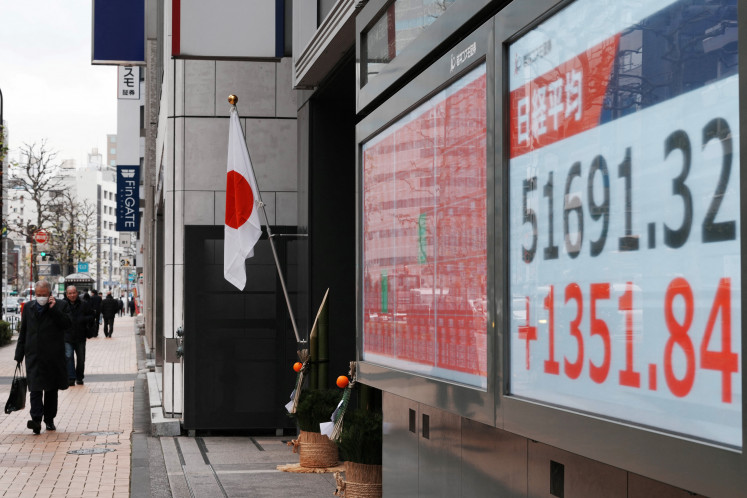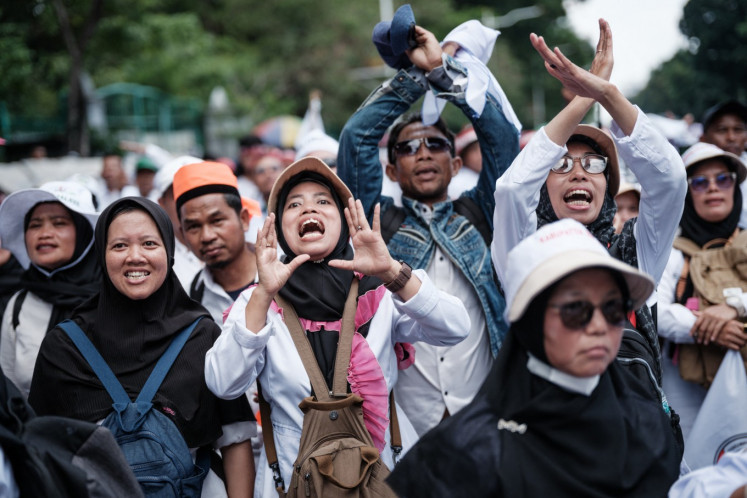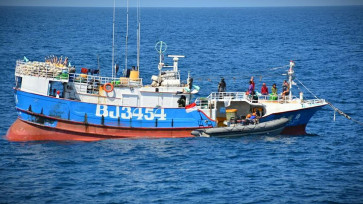Popular Reads
Top Results
Can't find what you're looking for?
View all search resultsPopular Reads
Top Results
Can't find what you're looking for?
View all search resultsMASS: A challenge for Indonesia’s maritime fulcrum dream
Indonesia needs to review its legal framework to anticipate the advent of automous marine vessels in light of its aspirations to become the world's "maritime fulcrum".
Change text size
Gift Premium Articles
to Anyone
 Sailors from the Indonesian Navy’s KRI Usman Harun 359 warship conduct on Jan. 22, 2021 a visit, board, search and seizure (VBSS) procedure on Taiwanese fishing vessel Hai Chien Hsing 20, which was discovered carrying out illegal, unreported, unregulated (IUU) fishing activities in Indonesian waters. (Courtesy of Indonesian Navy/-)
Sailors from the Indonesian Navy’s KRI Usman Harun 359 warship conduct on Jan. 22, 2021 a visit, board, search and seizure (VBSS) procedure on Taiwanese fishing vessel Hai Chien Hsing 20, which was discovered carrying out illegal, unreported, unregulated (IUU) fishing activities in Indonesian waters. (Courtesy of Indonesian Navy/-)
W
hen he took office in 2014, President Joko “Jokowi” Widodo envisioned Indonesia as a global maritime fulcrum, given that the country is the largest archipelagic nation in the world with marine waters accounting for more than 70 percent of its territory. Sandwiched by the Indian and Pacific oceans, no doubt Indonesia is an important hub for maritime transportation between the Asia-Pacific and Europe.
As a consequence of its geographical setting, Indonesia faces major maritime issues, both traditional and nontraditional, in particular issues of marine environment, safety and security on entering a new era of marine technology called the maritime autonomous surface ship (MASS), the equivalent of an unmanned aerial vehicle at sea.
Autonomous means discouraging human involvement in onboard decision-making. This will be challenging, due to the limited direct watch of the shipmaster in the event of potential distress. Coastal states will confront legal challenges in practicing visit, board, search, seizure (VBSS) and search and rescue (SAR) operations, as well as in preventing security threats like terrorist activities.
A different approach is a must when discussing MASS. Unlike conventional vessels, driven and fully controlled by a human shipmaster, MASS will respond differently depending on the degree of human control, according to the Regulatory Scoping Exercise (RSE) of the International Maritime Organization (IMO). Meanwhile, other international conventions, such as the International Regulations for Preventing Collisions at Sea (COLREGs) 1972 and the International Convention for the Safety of Life at Sea 1974 (SOLAS), require human presence onboard.
MASS is alien to the 1982 United Nations Convention on the Law of the Sea (UNCLOS), but the RSE defines MASS as a vessel that, at varying degrees of autonomy, can operate independently. Degrees 1 and 2 MASS still have humans onboard as due regard and to mitigate distress situations that may occur during sea voyages.
On the contrary, degrees 3 and 4 MASS do not require humans onboard, since the vessel will be commanded over the seas completely through the internet. Degree 4, the ultimate degree of autonomy, speaks volumes of artificial intelligence (AI). These two MASS degrees will provide complexity as regards marine environment, safety and security practices in Indonesia as well as the world.
Indonesia has often dealt with vessels dumping waste or spilling hazardous materials into its waters as a result of an accident. Any harmful event occurring within Indonesian jurisdiction will be handled by through VBSS conducted by either the Indonesian Navy or the Indonesian Sea and Coast Guard to determine who will be liable or responsible for such activities. An issue arises when it comes to conducting VBSS for degree 3 and degree 4 MASS, as the vessels cannot be stopped on the spot.


















